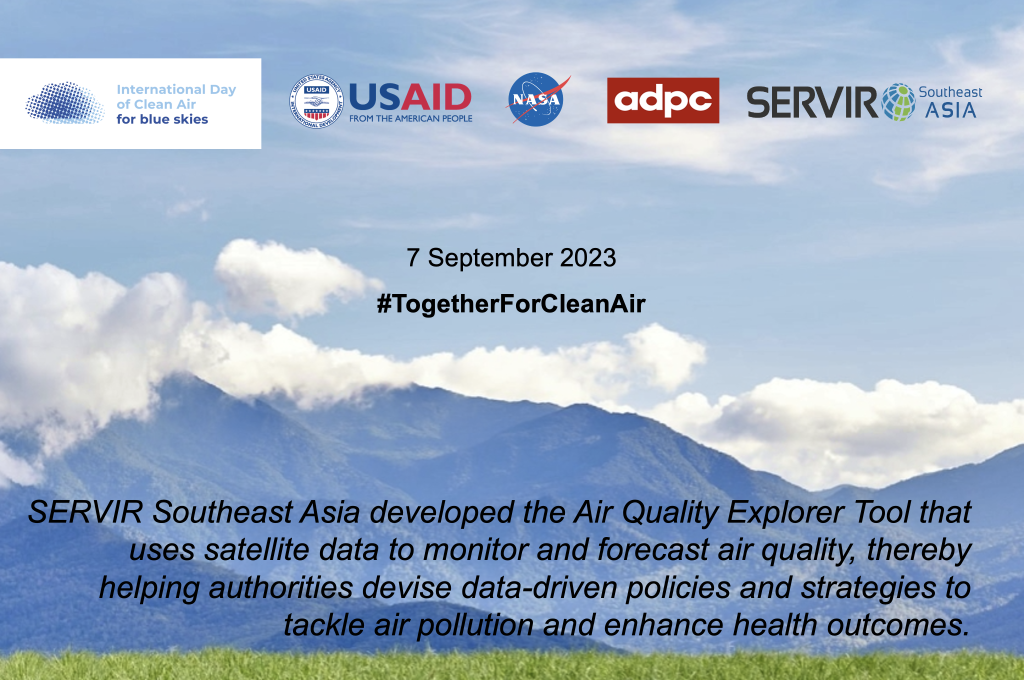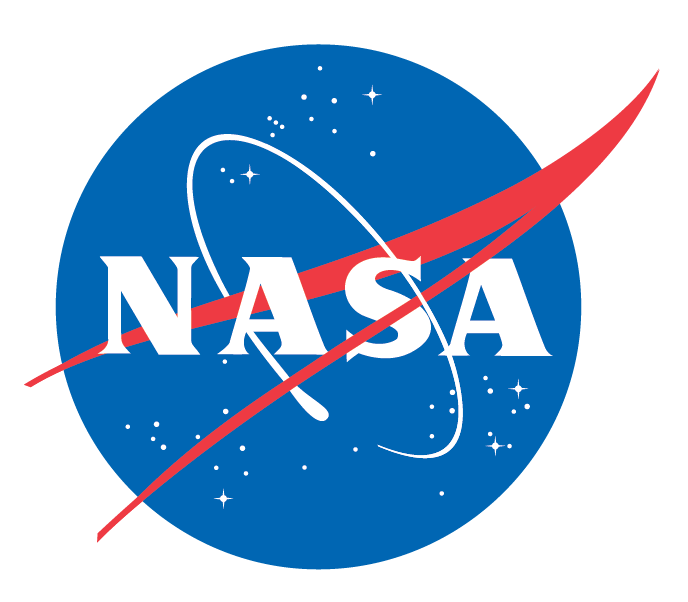SERVIR Southeast Asia Supports International Day of Clean Air for Blue Skies

What is the International Day of Clean Air for Blue Skies?
The United Nations General Assembly in 2019 declared 7 September as the International Day of Clean Air for Blue Skies. The General Assembly was encouraged by an increasing interest of the international community in clean air, and emphasizing the need to make further efforts to improve air quality, including reducing air pollution, to protect human health.
Why is it important?
“We can save as many as 150 million lives this century and help clean our atmosphere,” says António Guterres, the U.N. Secretary General.
Air pollution is the biggest environmental health risk of our time. Over 99 % of people breathe unsafe air.
Exposure can lead to stroke, heart and lung diseases, cancer and more. Polluted air kills 6.7 million people per year, and 2.4 billion people are exposed to dangerous levels of household air pollution.
Air pollution is transboundary – all stakeholders have a responsibility to protect the earth’s atmosphere and ensure healthy air for everyone. Working together, across borders and boundaries, between sectors and beyond silos, will help reduce air pollution, leverage finance and investments towards air quality measures and solutions, and provide health benefits.
In 2019, Southeast Asia suffered over 230,000 deaths from poor air quality (PM2.5) according to the World Bank. PM2.5 refers to particulate matter with a diameter of 2.5 micrometers or less - that is 30 times smaller than the diameter of the human hair. The economic costs of the health effects of air pollution in Asia is estimated at US$1.7 trillion, or 10% of the region’s annual GDP reported by Asian Development Bank (ADB).
What is SERVIR Southeast Asia doing to improve air quality?
Implemented through a partnership between U.S. Agency for International Development (USAID), U.S. National Aeronautics and Space Administration (NASA), and Asian Disaster Preparedness Center (ADPC), SERVIR Southeast Asia (SERVIR SEA) uses publicly available satellite data to address climate change and sustainable development challenges.
SERVIR SEA provides accurate, near-real time information and three-day forecasts on air pollutant concentration, atmospheric conditions, and fire hotspots using satellite data, providing much needed coverage in regions that do not have ground stations installed for monitoring air quality.
SERVIR SEA Air Quality Explorer Tool’s customized fire hotspot data is being used very successfully by first responders and forest officials in Northern Thailand to detect fire hotspots and undertake targeted interventions to put out the fires.
Citizen Scientists in Thailand have used data from SERVIR SEA’s Asia’s Air Quality Explorer Tool to develop the Smoke Watch Application which was awarded Thailand’s National Innovation Award in 2021. The Smoke Watch App is a great demonstration of the innovations made possible using data from SERVIR SEA. After successful prototyping, it is expected that Smoke Watch will be scaled to other parts of Southeast Asia.
Timely management of fire hotspots helps to reduce pollution in the atmosphere and enhance health outcomes; it also promotes the sustainable management of landscapes in the long term.
SERVIR SEA plans to support the ASEAN Secretariat, the ASEAN Coordinating Centre for Transboundary Haze Pollution Control (ACC THPC), and the ASEAN Member States (AMS) to prevent and monitor transboundary haze pollution as a result of land and/or forest fires, as defined in the ASEAN Agreement on Transboundary Haze Pollution (AATHP).
To support the implementation of the ASEAN Haze-free Roadmap, SERVIR SEA collaborates with the Thailand Pollution Control Department (PCD) and scales out the success of air quality forecasting, modeling, and the implementation.
SERVIR SEA also supports the UNESCAP Asia-Pacific Regional Action Programme on Air Pollution (RAPAP). The RAPAP shares with SERVIR SEA the objective of improving air quality management by promoting science-based and policy-oriented cooperation.
How is air quality linked with climate change?
Climate change can impact air quality and, conversely, air quality can impact climate change like a virtuous cycle. According to the European Union’s Science for Environmental Policy’s issue on Air pollution and Climate Change, burning carbon-based fuels emits carbon dioxide (CO2) and other pollutants, including particulate matter that can cool or heat the Earth’s climate by reflecting or absorbing radiation from the sun.
One type of particulate matter, namely black carbon, remains in the atmosphere for a relatively short time (one week), but strongly absorbs solar radiation. Black carbon emitted from domestic burning of solid fuels, forest fires, and high emitting diesel engines is likely to contribute to warming the climate.
Black carbon is estimated to be responsible for approximately 15% of the current excessive warming of global temperatures. Additionally, climate change is likely to increase concentrations of ozone, one of the most important urban air pollutants responsible for respiratory problems. Short-term reductions in black carbon can potentially delay the impact of global warming by approximately 10 years.
How can you support clean air for blue skies?
All of us have a role to play, collectively and individually, in ensuring that the air we breathe is clean. We have a mutual responsibility to leave clean air and blue skies for future generations. Individually, the decisions we make on a daily basis can help this cause.
There are several mobile applications that help us track air quality to make informed decisions about our health. On days with poor air quality, it is advisable to stay at home and refrain from outdoor activities, especially for the elderly and those with existing health Conditions.
Use public transport frequently. When public transport is unavailable, use zero emission vehicles, including bicycles, for personal mobility and make car-pooling a habit.
We need to demand greater access to public transport while we formulate stronger emissions standards on vehicles, power plants, construction and industries to cut pollution. As a society, we need to transition towards clean cooking and clean heating and increase investments in renewable energy. We must phase out coal completely.



